COVID-19 confirmed deaths in England (to 31 October 2021): report
Updated 28 April 2023
COVID-19 deaths
The UK Health Security Agency (UKHSA) has published statistics on deaths in people with laboratory-confirmed COVID-19 since 29 April 2020. In this report we present the latest data on COVID-19 mortality. Further information on the data series can be found here.
Data sources
Cases of laboratory diagnosed COVID-19 resident in England were identified from the Second Generation Surveillance System (SGSS).
Fact and date of death were derived from combined sources: NHS England hospital deaths, Office for National Statistics (ONS) death registrations, UKHSA Health Protection Team direct reporting and Demographic Batch Service tracing of laboratory-confirmed cases.
Definitions
In this report deaths are defined as a death in a person with a laboratory-confirmed positive COVID-19 test and either:
- died within 60 days of the first specimen date
or
- died more than 60 days after the first specimen date with COVID-19 mentioned on the death certificate
This data does not include deaths in people where COVID-19 is suspected but not confirmed by testing (SARS-CoV-2 PCR either negative or not tested). This data does not report cause of death, and as such represents all deaths in people with laboratory-confirmed COVID-19, not just those caused by COVID-19. In this report, data is reported from 1 November 2020 to 31 October 2021. Mortality rates are calculated using 2019 ONS population estimates data. Age-standardised rates adjust for differences in the age structure of populations. The standard used throughout this report is the European Standard Population 2013.
Methods
Mortality rates presented for different time periods have been annualised in order to enable comparisons. This method involves adjusting the population data used to calculate rates for the time period covered, these are expressed as mortality rates per 100,000 population per year. These rates cannot be compared with rates that do not have this adjustment. Mortality rates by region, local authority, sex, ethnic group and Index of Multiple Deprivation (IMD) have been age-standardised to account for the different age distributions within different populations. All figures displaying mortality rates have been calculated using a 7-day rolling average, to allow for smoothing of fluctuating data.
To note, from 6 July 2021, ethnicity data has been updated based on a new method for assigning ethnicity developed by UKHSA. The previous method used the most recent ethnicity recorded through linkage to Hospital Episode Statistics and was supplemented by self-reported ethnicity recorded on test request forms. The new method uses self-reported ethnicity from test request forms and supplements this with the most frequent ethnicity recorded through linkage to Hospital Episode Statistics, unless the most frequent was ‘Other’ when the second most frequent was chosen. The new method has resulted in a reduction in the number of cases allocated to the ‘other’ ethnic group and a slight increase in the % allocated to all other ethnic groups. To note, from September 2021 all data is presented for the last 12 months.
COVID-19 mortality rates
Within the period 1 November 2020 to 31 October 2021, 6,851,466 cases of COVID-19 were detected in England. In the same period, there have been 97,191 deaths in persons with laboratory-confirmed COVID-19. This represents a crude mortality rate of 171.9 per 100,000 population. From 1 November 2020 onwards, the highest recorded number of daily deaths was 1,364 deaths on 19 January 2021.
Table 1. Number of laboratory-confirmed cases, deaths and crude mortality rate (per 100,000 population) in laboratory-confirmed cases of COVID-19, by month*†
| Month | Cases | Deaths | Crude mortality rate (95% CI) |
|---|---|---|---|
| Nov-20 | 526,542 | 11,653 | 20.6 (20.2-21.0) |
| Dec-20 | 862,041 | 15,873 | 28.1 (27.6-28.5) |
| Jan-21 | 1,079,373 | 33,338 | 59.0 (58.3-59.6) |
| Feb-21 | 292,561 | 16,504 | 29.2 (28.7-29.6) |
| Mar-21 | 136,066 | 5,219 | 9.2 (9.0-9.5) |
| Apr-21 | 59,616 | 1,323 | 2.3 (2.2-2.5) |
| May-21 | 61,925 | 508 | 0.9 (0.8-1.0) |
| Jun-21 | 297,009 | 470 | 0.8 (0.8-0.9) |
| Jul-21 | 936,307 | 1,603 | 2.8 (2.7-3.0) |
| Aug-21 | 784,616 | 3,098 | 5.5 (5.3-5.7) |
| Sep-21 | 764,185 | 3,709 | 6.6 (6.3-6.8) |
| Oct-21 | 1,051,225 | 3,893 | 6.9 (6.7-7.1) |
*Data is presented from 1 November 2020 to 31 October 2021. Due to continuous data quality improvements, reported number of cases and deaths may be subject to fluctuations. These numbers represent a snapshot of the number of cases and deaths at the time of report production.
†Deaths within 60 days of a positive COVID-19 test or where COVID-19 is mentioned on the death certificate.
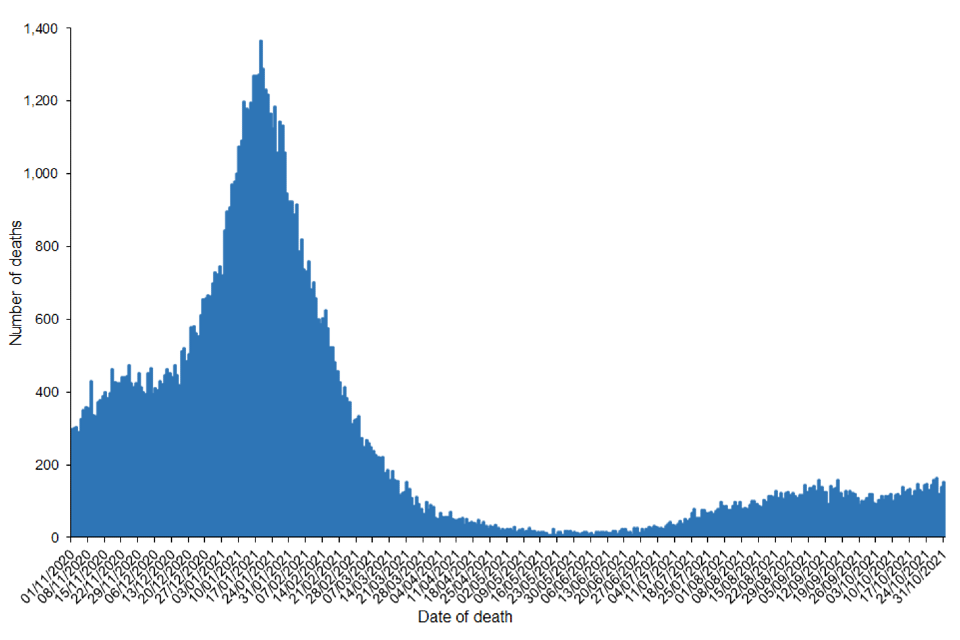
Figure 1. Number of deaths in laboratory-confirmed cases of COVID-19 by date of death, from 1 November 2020 to 31 October 2021*†
*Data is presented from 1 November 2020 to 31 October 2021.
†Deaths within 60 days of a positive COVID-19 test or where COVID-19 is mentioned on the death certificate.
Age and sex distribution
Since 1 November 2020, the mortality rate was highest among those aged over 80 (annualised rate of 1,945 per 100,000 population per year).
Table 2. Number of deaths and annualised mortality rate** (per 100,000 population per year) in laboratory-confirmed cases of COVID-19, by age group†
| Age group | Deaths (1 November 2020 to 31 October 2021) | Mortality rate** (95% CI) (1 November 2020 to 31 October 2021) | Deaths (October 2021) | Mortality rate ** (95% CI) (October 2021) |
|---|---|---|---|---|
| <5 | <10 | 0.5 (0.3-0.8) | <10 | 1.5 (0.4-3.7) |
| 5-9 | <10 | 0.2 (0.1-0.4) | <10 | 0.7 (0.1-2.4) |
| 10-19 | 63 | 1.0 (0.7-1.2) | <10 | 1.6 (0.7-3.1) |
| 20-29 | 223 | 3.1 (2.7-3.5) | <10 | 2.0 (1.0-3.4) |
| 30-39 | 706 | 9.3 (8.7-10.0) | <10 | 6.5 (4.7-8.8) |
| 40-49 | 1,876 | 26.4 (25.2-27.6) | 106 | 17.5 (14.4-21.2) |
| 50-59 | 5,333 | 69.8 (68.0-71.7) | 248 | 38.2 (33.6-43.3) |
| 60-69 | 11,124 | 186.0 (182.5-189.5) | 542 | 106.7 (97.9-116.1) |
| 70-79 | 22,297 | 462.2 (456.2-468.3) | 995 | 242.8 (228.0-258.4) |
| 80+ | 55,544 | 1,945.1 (1928.9-1961.3) | 1,932 | 796.6 (761.5-832.9) |
Note: Numbers of deaths fewer than 10 have been excluded to minimise the risk of deductive disclosure.
**Rates are annualised and expressed as the number of deaths per 100,000 population per year.
†Deaths within 60 days of a positive COVID-19 test or where COVID-19 is mentioned on the death certificate.
From 1 November 2020 to 31 October 2021, 52,260 (annualised rate of 215.3 per 100,000 population per year) deaths have occurred in males and 44,930 (143.8 per 100,000 per year) in females. The mortality rate in both sexes in October was considerably lower than the average for the total period of 1 November 2020 to 31 October 2021.
Table 3. Number of deaths and age-adjusted annualised mortality rate ** (per 100,000 population) in laboratory-confirmed cases of COVID-19, by sex*†
| Sex | Deaths (1 November 2020 to 31 October 2021) | Age-adjusted mortality rate** (95% CI) (1 November 2020 to 31 October 2021) | Deaths (October 2021) | Age-adjusted mortality rate** (95% CI) (October 2021) |
|---|---|---|---|---|
| Female | 44,930 | 143.8 (142.5-145.1) | 1,707 | 5.6 (5.3-5.8) |
| Male | 52,260 | 215.3 (213.4-217.1) | 2,185 | 9.0 (8.6-9.3) |
**Rates are annualised and expressed as the number of deaths per 100,000 population per year.
†Deaths within 60 days of a positive COVID-19 test or where COVID-19 is mentioned on the death certificate.
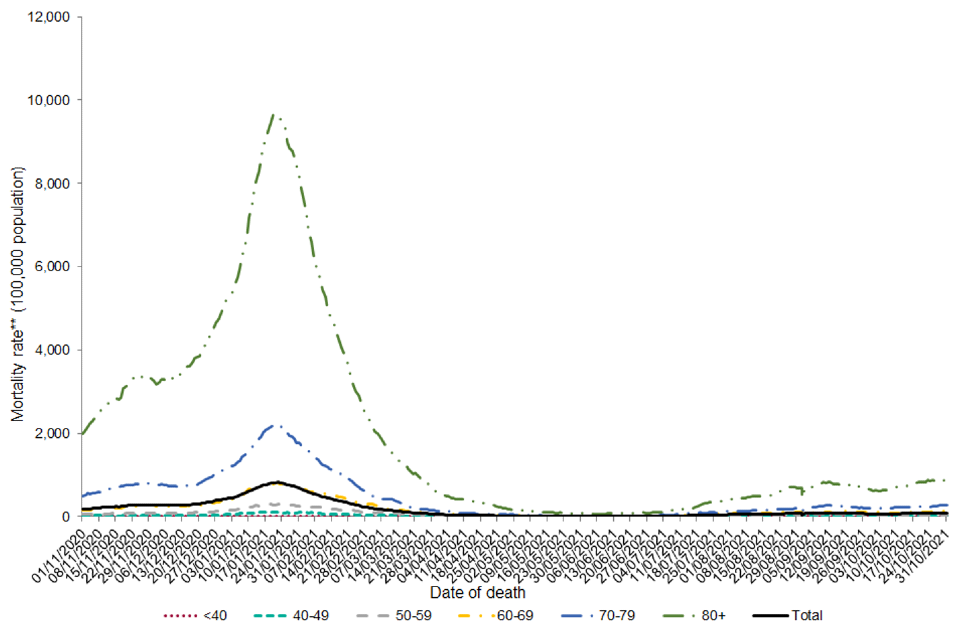
Figure 2.a. Seven-day rolling average annualised mortality rates** (per 100,000 population per year) in laboratory-confirmed cases of COVID-19 by age group, from 1 November 2020 to 31 October 2021*†
*Data is presented from 1 November 2020 to 31 October 2021.
**Rates are annualised and expressed as the number of deaths per 100,000 population per year.
†Deaths within 60 days of a positive COVID-19 test or where COVID-19 is mentioned on the death certificate.
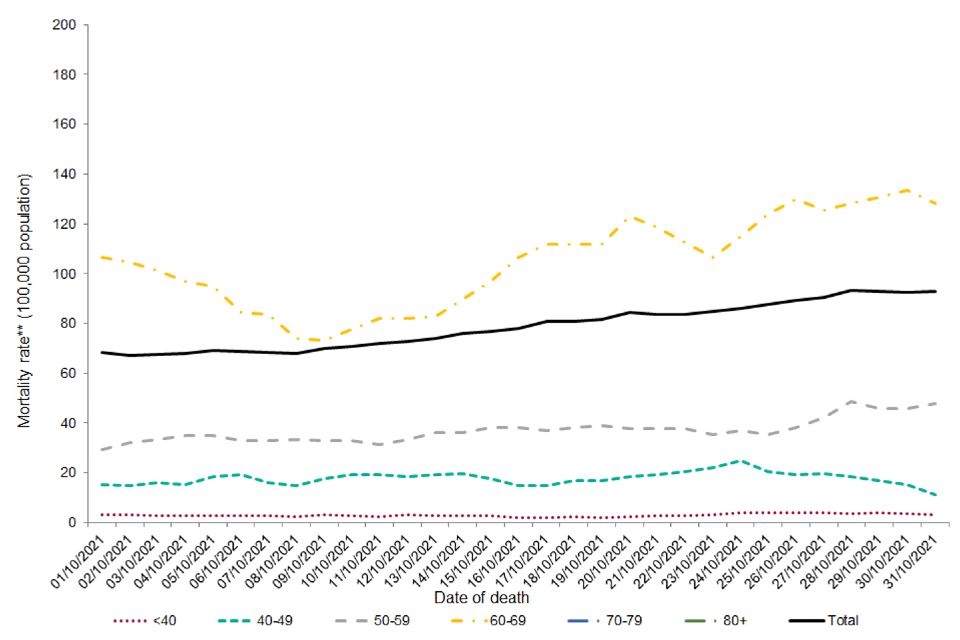
Figure 2.b. Seven-day rolling average annualised mortality rates** (per 100,000 population) in laboratory-confirmed cases of COVID-19 by age group, October 2021*†
*Data is presented from 1 October to 31 October 2021.
**Rates are annualised and expressed as the number of deaths per 100,000 population per year.
†Deaths within 60 days of a positive COVID-19 test or where COVID-19 is mentioned on the death certificate.
Ethnicity
Overall, the age-adjusted annualised mortality rate from 1 November 2020 onwards was highest among those of Asian or Asian British ethnic groups (annualised rate of 365.5 per 100,000 population per year) followed by those of Black and Black British ethnic groups (annualised rate of 320.2 per 100,000 population per year).
Table 4. Number of deaths and age-adjusted annualised mortality rate** (per 100,000 population) in laboratory-confirmed cases of COVID-19, by ethnicity†
| Ethnic category *** | Deaths (1 November 2020 to 31 October 2021) | Age-adjusted mortality rate** (95% CI) (1 November 2020 to 31 October 2021) | Deaths (October 2021) | Age-adjusted mortality rate** (95% CI) (October 2021) |
|---|---|---|---|---|
| White | 84,486 | 167.8 (166.6-168.9) | 3,395 | 6.8 (6.6-7.0) |
| Black/Black British | 2,818 | 320.0 (307.5-332.8) | 109 | 11.7 (9.5-14.3) |
| Asian/Asian British | 6,892 | 365.5 (356.4-374.7) | 234 | 12.5 (10.9-14.3) |
| Mixed/Multiple ethnic groups | 478 | 170.5 (154.1-187.7) | 21 | 5.6 (3.1-9.0) |
| Other± | 513 | 238.4 (216.3-261.8) | 17 | 7.4 (4.1-12.1) |
**Rates are annualised and expressed as the number of deaths per 100,000 population per year.
***Ethnic categories are based on ONS classifications.
±The rates in the Other ethnic group are likely to be an overestimate due to the difference in the method of allocating ethnicity codes to the deaths data and the population data used to calculate the rates.
†Deaths within 60 days of a positive COVID-19 test or where COVID-19 is mentioned on the death certificate.
Note: From 6 July 2021, ethnicity data has been updated based on a new method for assigning ethnicity developed by UKHSA which has resulted in a decrease in deaths in ‘other ethnicity’ category. This month’s ethnicity data is not comparable to previous months.
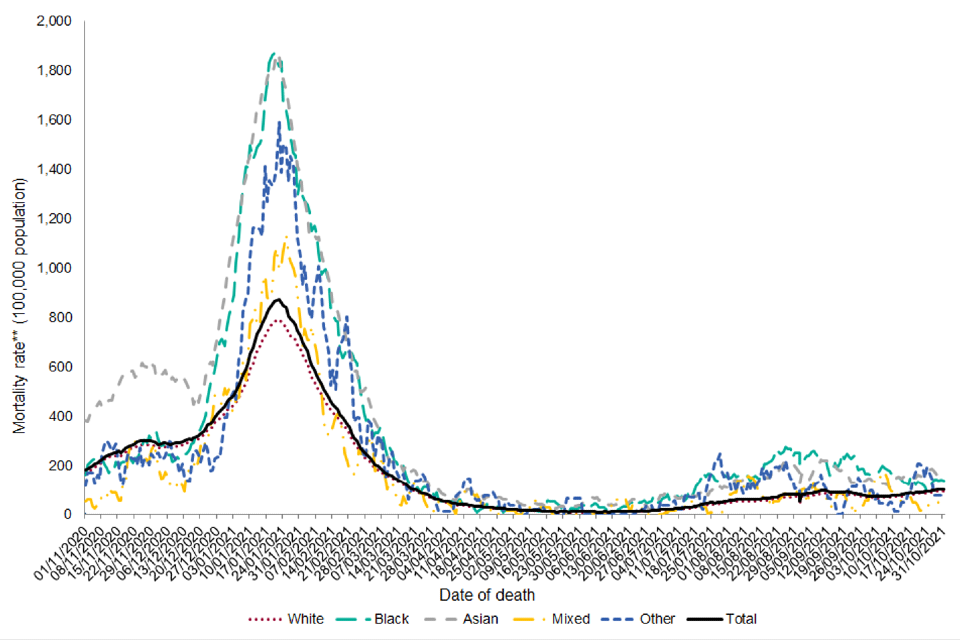
Figure 3.a. Seven-day rolling average age-adjusted annualised mortality rates** (per 100,000 population) in laboratory-confirmed cases of COVID-19 by ethnicity***±, 1 November 2020 to 31 October 2021*†
*Data is presented from 1 November 2020 to 31 October 2021.
**Rates are annualised and expressed as the number of deaths per 100,000 population per year.
***Ethnic categories are based on ONS classifications.
±The rates in the Other ethnic group are likely to be an overestimate due to the difference in the method of allocating ethnicity codes to the cases data and the population data used to calculate the rates.
†Deaths within 60 days of a positive COVID-19 test or where COVID-19 is mentioned on the death certificate.
Note: From 6 July 2021, ethnicity data has been updated based on a new method for assigning ethnicity developed by UKHSA which has resulted in a decrease in deaths in ‘other ethnicity’ category. This month’s ethnicity data is not comparable to previous months.
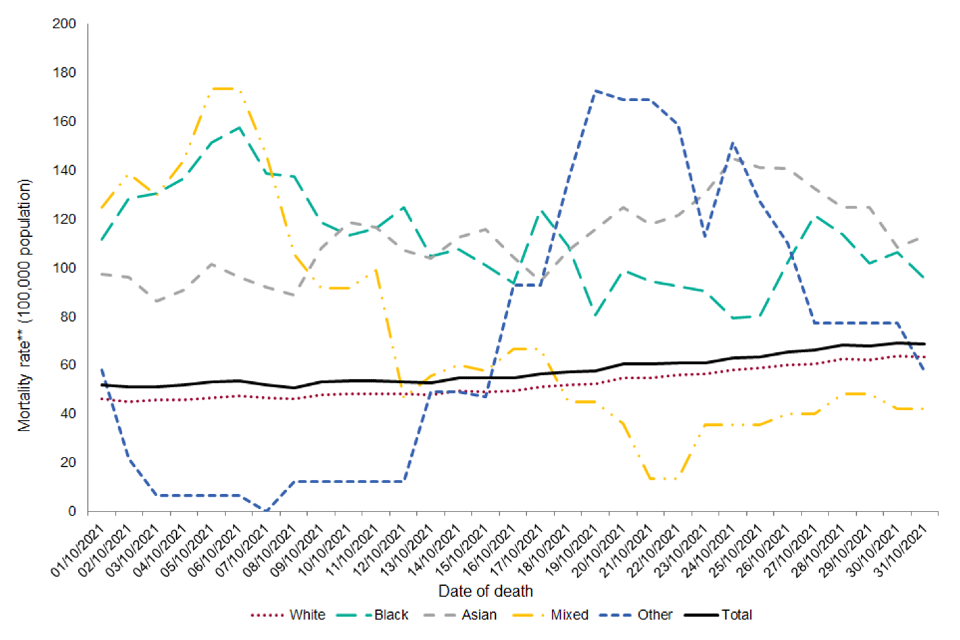
Figure 3.b. Seven-day rolling average age-adjusted mortality rates** (per 100,000 population) in laboratory-confirmed cases of COVID-19 by ethnicity***±, October 2021*†
*Data is presented from 1 October to 31 October 2021.
**Rates are annualised and expressed as the number of deaths per 100,000 population per year.
±The rates in the Other ethnic group are likely to be an overestimate due to the difference in the method of allocating ethnicity codes to the cases data and the population data used to calculate the rates.
†Deaths within 60 days of a positive COVID-19 test or where COVID-19 is mentioned on the death certificate.
Note: From 6 July 2021, ethnicity data has been updated based on a new method for assigning ethnicity developed by UKHSA which has resulted in a decrease in deaths in ‘other ethnicity’ category. This month’s ethnicity data is not comparable to previous months.
Deprivation
Relative deprivation was assessed using quintiles of the IMD linked to residential lower super output area, with IMD 1 representing the most deprived. Overall, from 1 November 2020, the age-adjusted annualised mortality rate is highest among those living in the most deprived areas, with a gradual decrease in mortality rate seen with decreasing deprivation. In October 2021, the age-adjusted annualised mortality rate is highest among those living in areas of IMD quintiles 1 and 2, and the lowest mortality rate is seen among those in the least deprived quintile, quintile 5.
Table 5. Number of deaths and age-adjusted annualised mortality rate** (per 100,000 population) in laboratory-confirmed cases of COVID-19, by IMD quintile*†
| IMD Quintile (1 most deprived) | Deaths (1 November 2020 to 31 October 2021) | Age-adjusted mortality rate** (95% CI) (1 November 2020 to 31 October 2021) | Deaths (October 2021) | Age-adjusted mortality rate** (95% CI) (October 2021) |
|---|---|---|---|---|
| 1 | 22,777 | 281.0 (277.3-284.6) | 1,016 | 12.5 (11.7-13.3) |
| 2 | 20,682 | 213.5 (210.5-216.4) | 802 | 8.2 (7.7-8.8) |
| 3 | 19,087 | 165.0 (162.7-167.4) | 755 | 6.6 (6.1-7.1) |
| 4 | 17,964 | 143.7 (141.6-145.8) | 706 | 5.7 (5.3-6.1) |
| 5 | 16,180 | 123.9 (122.0-125.9) | 573 | 4.5 (4.1-4.8) |
**Rates are annualised and expressed as the number of deaths per 100,000 population per year.
†Deaths within 60 days of a positive COVID-19 test or where COVID-19 is mentioned on the death certificate.
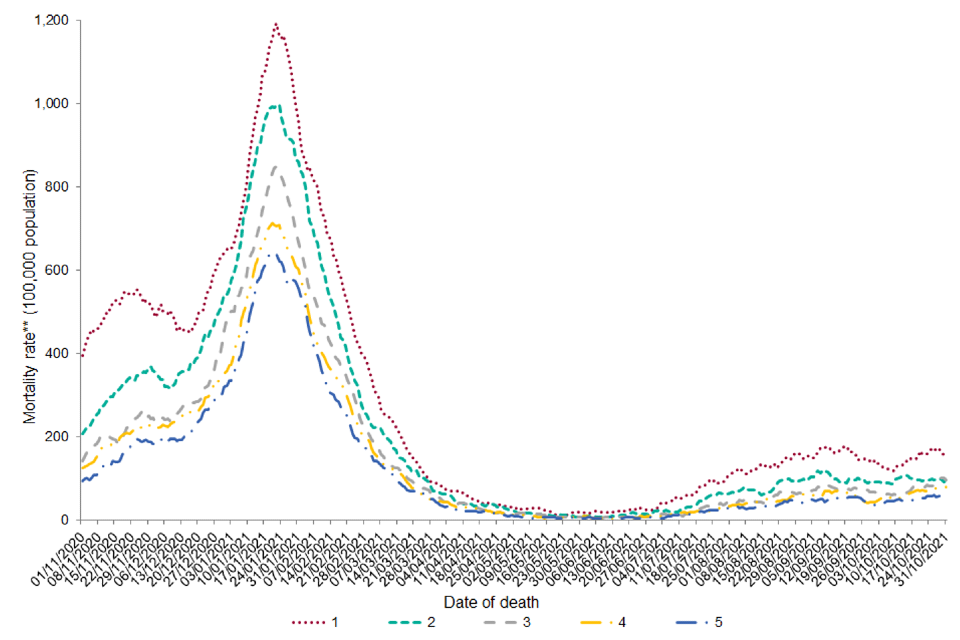
Figure 4.a. Seven-day rolling average age-adjusted annualised mortality rate** (per 100,000 population) in laboratory-confirmed cases of COVID-19 by IMD quintile, 1 November 2020 to 31 October 2021*†
*Data is presented from 1 November 2020 to 31 October 2021.
**Rates are annualised and expressed as the number of deaths per 100,000 population per year.
†Deaths within 60 days of a positive COVID-19 test or where COVID-19 is mentioned on the death certificate.
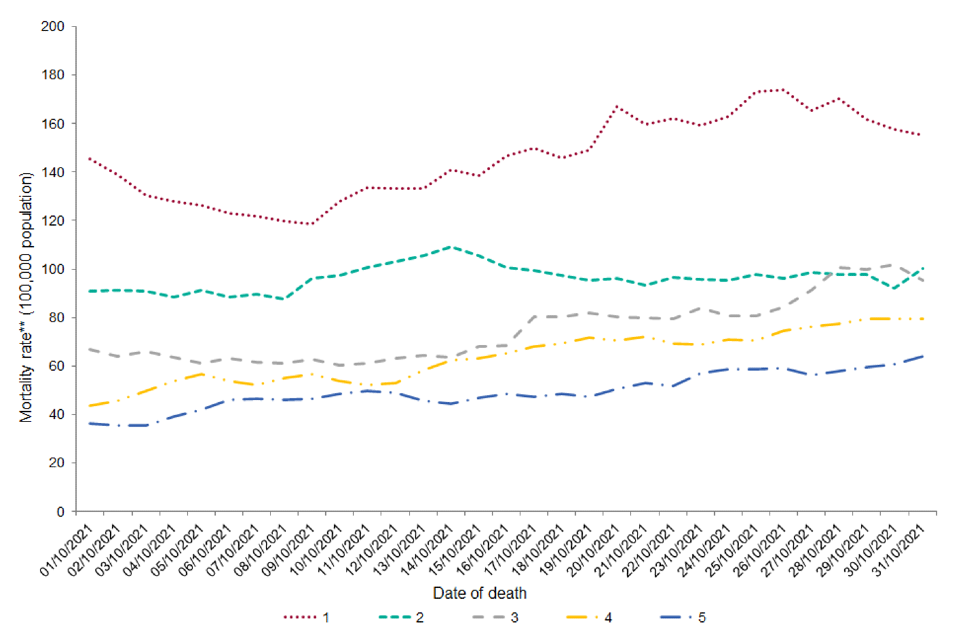
Figure 4.b. Seven-day rolling average age-adjusted annualised mortality rate** (per 100,000) population in laboratory-confirmed cases of COVID-19 by IMD quintile, October 2021*†
*Data is presented from 1 October to 31 October 2021.
**Rates are annualised and expressed as the number of deaths per 100,000 population per year.
†Deaths within 60 days of a positive COVID-19 test or where COVID-19 is mentioned on the death certificate.
Regional breakdown
Since 1 November 2020, the annualised mortality rate was highest in London (205.2 per 100,000 population per year), followed by the North West (202.2 per 100,000 population per year) and the West Midlands (200.1 per 100,000 population per year). The lowest mortality rate was seen in the South West (99.0 per 100,000 population per year). In October, the highest annualised mortality rate was seen in the North East (9.8 per 100,000 population per year) and Yorkshire and Humber (9.8 per 100,000)
Table 6. Number of deaths and age-adjusted annualised mortality rate** (per 100,000 population) in laboratory-confirmed cases of COVID-19, by UKHSA centre*†
| UKHSA Centre | Deaths (1 November 2020 to 31 October 2021) | Age-adjusted mortality rate** (95% CI) (1 November 2020 to 31 October 2021) | Deaths (October 2021) | Age-adjusted mortality rate** (95% CI) (October 2021) |
|---|---|---|---|---|
| East Midlands | 9,297 | 189.6 (185.7-193.5) | 394 | 8.1 (7.3-8.9) |
| East of England | 12,288 | 179.2 (176.1-182.4) | 381 | 5.6 (5.0-6.2) |
| London | 12,418 | 205.2 (201.6-208.9) | 379 | 6.2 (5.6-6.9) |
| North East | 4,989 | 180.6 (175.6-185.7) | 270 | 9.8 (8.7-11.1) |
| North West | 14,527 | 202.2 (198.9-205.5) | 673 | 9.4 (8.7-10.1) |
| South East | 15,139 | 158.3 (155.8-160.9) | 396 | 4.2 (3.8-4.6) |
| South West | 6,640 | 99.0 (96.6-101.4) | 360 | 5.5 (4.9-6.1) |
| West Midlands | 11,734 | 200.1 (196.5-203.7) | 466 | 8.0 (7.3-8.7) |
| Yorkshire and Humber | 9,658 | 177.6 (174.0-181.2) | 533 | 9.8 (9.0-10.7) |
**Rates are annualised and expressed as the number of deaths per 100,000 population per year.
†Deaths within 60 days of a positive COVID-19 test or where COVID-19 is mentioned on the death certificate.
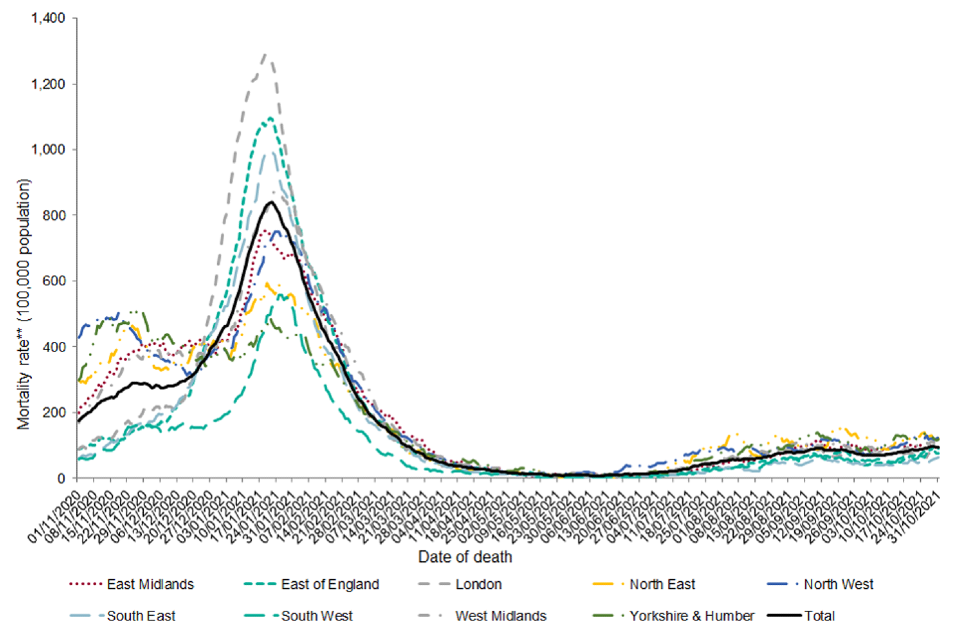
Figure 5.a. Seven-day rolling average age-adjusted annualised mortality rates** (per 100,000 population) in laboratory-confirmed cases of COVID-19 by UKHSA centre, 1 November 2020 to 31 October 2021*†
*Data is presented from 1 November 2020 to 31 October 2021.
**Rates are annualised and expressed as the number of deaths per 100,000 population per year.
†Deaths within 60 days of a positive COVID-19 test or where COVID-19 is mentioned on the death certificate.
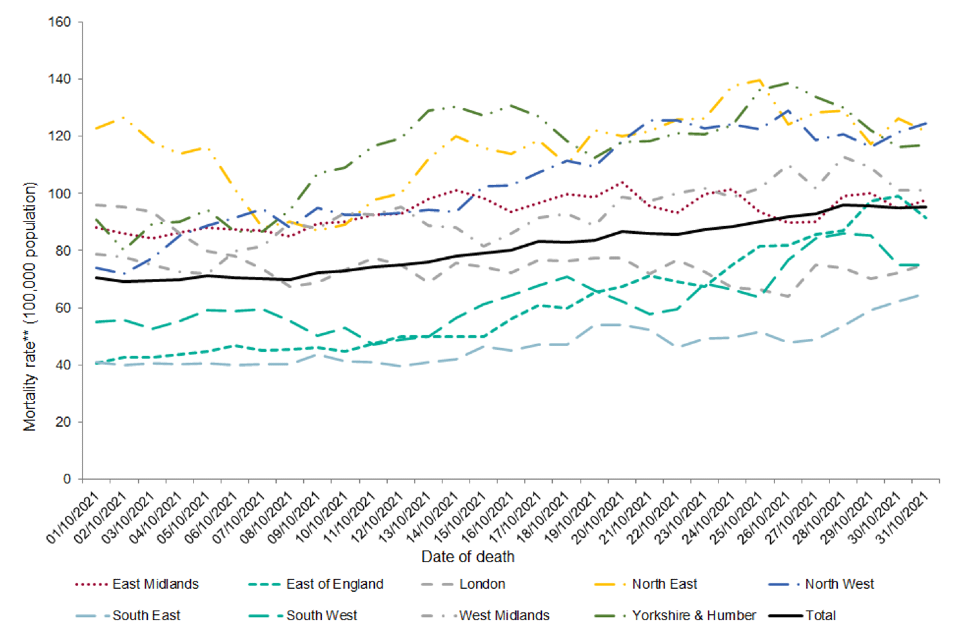
Figure 5.b. Seven-day rolling average age-adjusted annualised mortality rates** (per 100,000 population) in laboratory-confirmed cases of COVID-19 by UKHSA centre, October 2021*†
*Data is presented from 1 October to 31 October 2021.
**Rates are annualised and expressed as the number of deaths per 100,000 population per year.
†Deaths within 60 days of a positive COVID-19 test or where COVID-19 is mentioned on the death certificate.
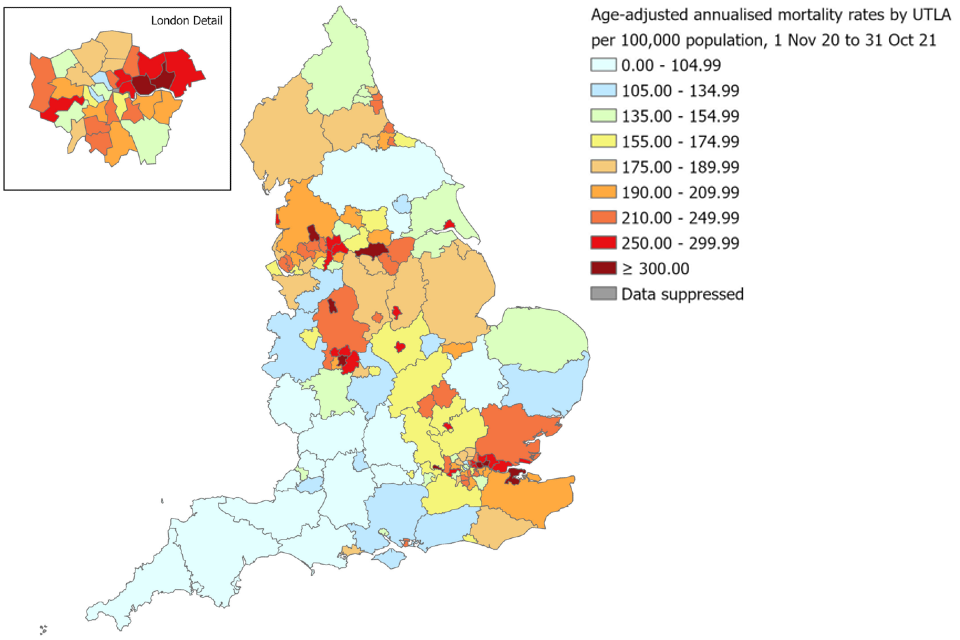
Figure 6.a. Age-adjusted annualised mortality rates** (per 100,000 population) in laboratory-confirmed cases of COVID-19 by upper-tier local authority, 1 November 2020 to 31 October 2021*†
*Data is presented from 1 November 2020 to 31 October 2021.
**Rates are annualised and expressed as the number of deaths per 100,000 population per year.
†Deaths within 60 days of a positive COVID-19 test or where COVID-19 is mentioned on the death certificate.
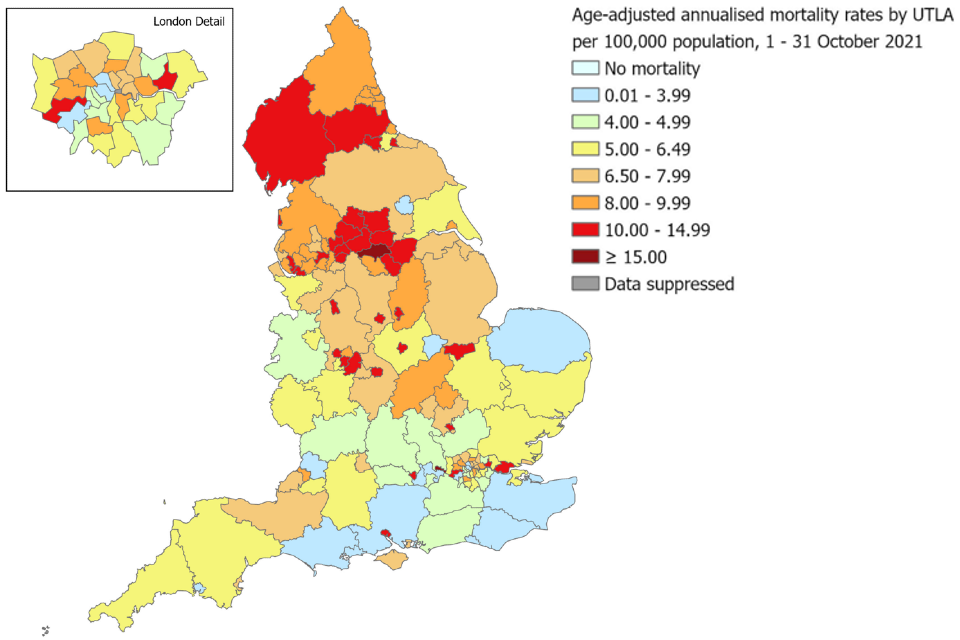
Figure 6.b. Age-adjusted annualised mortality rates** (per 100,000 population) in laboratory-confirmed cases of COVID-19, by upper-tier local authority, October 2021*†
*Data is presented from 1 October to 31 October 2021.
**Rates are annualised and expressed as the number of deaths per 100,000 population per year.
†Deaths within 60 days of a positive COVID-19 test or where COVID-19 is mentioned on the death certificate.
Figures 6a and 6b contain:
- Ordnance Survey data © Crown copyright and database right 2020
- National Statistics data © Crown copyright and database right 2020
Case fatality risk
Case fatality risk (CFR) describes the risk of death following a laboratory-confirmed positive COVID-19 test. For this report, CFR has been calculated within 60 days of an individual’s first positive specimen (from PCR, LAMP, and LFD tests) CFR is reported on data 1 November 2020 up to and including 6 September 2021. Cases diagnosed in the last 60 days were excluded from this analysis, due to incomplete follow-up period. Deaths are excluded from the CFR calculation if they cannot be linked to laboratory-confirmed COVID-19 case data.
CFR is sensitive to:
- changes in testing coverage and detection rate of COVID-19 infections (Dudel and others, 2020; Wu and others, 2020; Harman and others, 2021)
- changes in the demographics of the infected population
- changes in the effectiveness of treatment and the health system’s ability to care for severe COVID-19 cases
Table 7. Number of laboratory-confirmed cases, deaths and case fatality risk in laboratory-confirmed cases of COVID-19, 1 November 2020 to 6 September 2021*†
| Cases | Deaths† | Case Fatality Risk (%) | |
|---|---|---|---|
| 1 November 2020 to 6 September 2021 | 5,201,801 | 83,108 | 1.6 |
*Figures differ from Table 1 based on CFR calculation inclusion criteria.
†Deaths within 60 days of a positive COVID-19 test and linked to the confirmed COVID-19 case data.
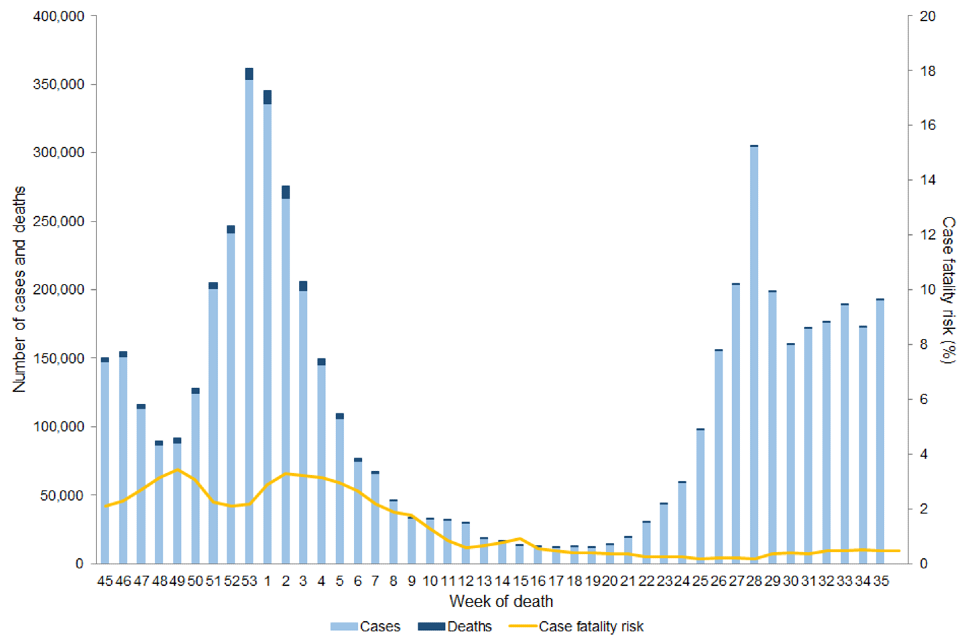
Figure 7. Number of laboratory-confirmed cases, deaths and case fatality risk in laboratory-confirmed cases of COVID-19, 1 November 2020 to 6 September 2021*†
Note: The time period presented covers a period where testing coverage and testing modes have changed significantly, therefore apparent changes in estimated case fatality should be interpreted with caution. Numbers of cases and deaths are stacked by week. Cases are presented by week of specimen date. Deaths are presented by week of death.
*Data presented from 1 November 2020 to 6 September 2021, the last full week of full data available.
†Deaths within 60 days of a positive COVID-19 test and linked to the confirmed COVID-19 case data.
